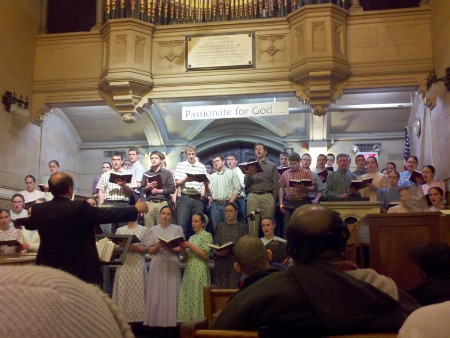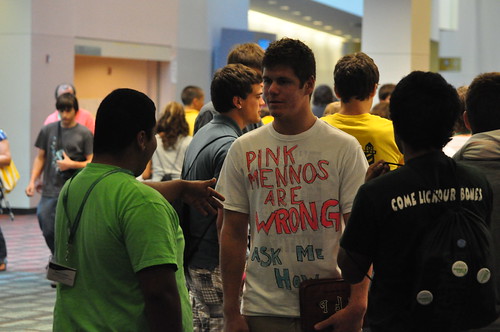
There’s a building boom on the Bowery these days. It’s been happening for a while, but the last couple years have witnessed an escalation in development, turning the neighborhood into a hip destination point.
Fifty years ago the Bowery was the largest skid row in the world. There were gin joints and flophouses on every block. That’s all gone now, thanks to the forces of gentrification. In their place are condos, art galleries and upscale eateries. Only one skid-row relic remains: the Bowery Mission.
Some of my earliest memories are of sitting behind the Mission’s pulpit in the 1960s, looking onto a sea of expectant faces while my father preached. In retrospect I realize the men behind those faces were awaiting the sermon’s conclusion so they could get their grub. (more…)
CharlieK
August 22, 2011
Anabaptism, Biographical, Change, Church, City, Civilization, Consumerism, culture, Current Events, Economics, Education, Ethics, Evangelism, Exclusion, God, Group Identity, History, Interfaith, Love, Mennonite Church USA, Mental health, Nonviolence, philosophy, Polarization, poverty, Power, Privilege, Race, Schism, Sex, Spiritual Life, Stewardship, Stories, The Bible, Theology, Tolerance, Tradition, Urban Ministry, Wealth
Read more >

I’ve been reading the thread of comments in response to my post on Anabaptist Ghosts on The Mennonite. I think the concerns by the Aaron Kauffman (read his comment) and Harold Miller (read his comment) are shared by others as well and need to be addressed.
As I understand them, one of the key arguments that Kauffman and Miller are making is that my focus on social advocacy and confrontation is “cutting [me] off from any word of wisdom that other parts of the Body of Christ might have to offer.” In other words, their claim is that the haunting social advocacy and confrontation, as I am describing it, does not leave room for dialogue.
(more…)
TimN
May 24, 2011
activism, LGBTQ, Mennonite Church USA, Peace & Peacemaking, TacticsErvin Stutzman
Read more >

This piece was originally published on my blog for The Mennonite magazine on May 9, 2011. You can read part 2 of the essay, Crisis and Conciliation here. You can read more blog posts related to the legacy of Ervin Stutzman here.
In this month’s editorial in The Mennonite, editor Everett Thomas quoted Mennonite Church USA executive director Ervin Stutzman as follows:
“The experience of Pink Mennos at Columbus in 2009,” Stutzman said, “introduced a new level of engagement in controversial matters … The techniques of social advocacy and confrontation that we have taught young adults in our schools has come to haunt our church’s most visible gathering, to the end that convention-goers feel immense pressure to take up sides against one another on [homosexuality].”
Mennonite pastor Amy Yoder McGloughlin has already written quite eloquently and diplomatically on how Ervin’s words ignore the real ghosts who haunt the Mennonite convention. So I’d like to focus particularly on Ervin’s use of the term, “haunt,” to refer to the use of social advocacy and confrontation by Pink Mennos. As a Mennonite, I find social advocacy and confrontation at the heart of the gospel and at the roots of my Anabaptist tradition. To suggest that those of us who sought to embody this tradition as Pink Mennos at Colombus were “haunting” the convention is highly problematic.
(more…)
TimN
May 9, 2011
Anabaptism, LGBTQ, Mennonite Church USA, Peace & Peacemaking, Tactics, Young FolksErvin Stutzman
Read more >
Recently, J. Denny Weaver spoke of his conversion from “passive” non-resistance and two-kingdom theology to an active stance against evil (reflection: can Mennonites use the term “evil”?) in Wisconsin. http://www.themennonite.org/issues/14-4/articles/Protesting_and_the_reign_of_God
While I approve of his stand, I must disagree with the theological conclusions of his article.
In speaking of two kingdom theology, Professor Weaver emphasizes the passive inaction of the theology. That it has nothing to say to oppression, that God is the God who empowers violence and the non-resistant have nothing to respond to injustice. Perhaps this is the form of two-kingdom theology that Professor Weaver learned, and I can see with a title like “non-resistance”, a theology might be prone to inaction. Certainly passivity is a concern among many who are raised “non-resistant”.
But two-kingdom theology is not about passivity. Certainly there is a passive aspect to it, even as Jesus said, “My kingdom is not of this world. If my kingdom were of this world, my servants would be fighting.” So there are actions that those of Jesus’ kingdom do not take. However, the foundational law of the kingdom of Jesus is active: “Love your neighbor as yourself.” Love isn’t passive, but active. Like the Samaritan in Jesus story, the one of Jesus’ kingdom cannot look at one hurt in the gutter and not act. (more…)
SteveK
April 27, 2011
activism, Anabaptism, Church, Community, Love, Nonviolence, Peace & Peacemaking, poverty, Power, Theology
Read more >
crossposted from As of Yet Untitled
One of the things I’ve noticed in my work as outreach coordinator for Christian Peacemaker Teams (CPT) is that the least well known project is CPT’s work with aboriginal peoples here in North America. So this spring I decided to spend time on the Aboriginal Justice team in order to support the team better and understand the struggles of our indigenous partners.
I just returned from Kenora, Ontario, home of one of Ontario’s major paper mills and supply town for many indigenous communities in the area. We also spent a week at Grassy Narrows, also known as (the reserve of the) Asubpeeschoseewagong Netum Anishinabe.
During my time at Grassy Narrows, for the first time in my life I saw first hand the continuing effects of the 500-year history of colonization and genocide on this continent. It’s a testimony to the effectiveness of white settlement and ethnic cleansing; I had never come face to face with these realities before in a personal way.
(more…)
TimN
April 12, 2011
Nonviolence, Race
Read more >
Brian McLaren recently published an article addressing the question, “Is God Violent?” In it he makes a case for God’s nonviolent nature that merits a response–both internal and external–from those of us who desire to follow Jesus.
To read McLaren’s article, click here (NOTE: you will be prompted to register in order to view it).
I’ve wanted to respond to McLaren’s essay for a while.
So when the March 2011 issue of Sojourners showed up in my mailbox, I determined it was time to slow down and reflect on his propositions and the nature of God as I understand it.
McLaren frames his essay in response to the notion that God is violent, as is reflected in the Old Testament narrative and which culminates in Christ’s crucifixion at Calvary.
It’s an idea that many Christians (and Jews, and Muslims) hold true, but McLaren identifies how this profoundly impacts how we interact with one another on multiple levels.
(more…)
BrianP
February 21, 2011
Anabaptism, Faith, Nonviolence, Peace & Peacemaking, Theology, warAnabaptism, Brian McLaren, Brian Paff, creative nonviolence, Is God violent?, Laurelville, Mennonites, Nonviolence, pacifism, peace, Peace & Peacemaking, Pittsburgh 2011, Sojourners
Read more >

An iconic image of prayerful resistance in the face of riot police from the protests in Egypt today.
The photographer is anonymous. Original posted by ollywainwright here: http://twitpic.com/3u6gvc/full
Here’s video footage of the same incident (more…)
TimN
January 28, 2011
Current Events, Police, Police Brutality, Tactics
Read more >
Nearly two weeks after my first post on Wikileaks, their diplomatic cables and the resulting fall out continue to make the front page news. The arrest of Assange and attacks on Mastercard, Visa and Paypal by “Operation Payback” have garnered far more attention then the cables themselves. The New York Times quoted one Internet guru comparing Operation Payback to the battle at Lexington that started the Revolutionary war in the United States.
In looking at “Operation Payback” and its denial of service attacks, journalists have begun to focus on Anonymous, which is typically described as the group of hackers behind the attacks. Some portray it as a shadowy cadre of internet vigilantes, meeting somewhere out there in the ether, plotting their next strike. Others paint a heroic picture of activists fighting for free speech against giant corporations and governments. Estimates of the number of people (or computers) involved vary widely.
A little bit of history is useful in understanding Anonymous. I first came became aware of Anonymous through their Project Chanology campaign which focused around opposition to Scientology. In their protests outside Scientology offices, they wore masks modeled on that worn by the main character in V is for Vendetta. Along with demonstrations, their tactics used by Project Chanology were a lot like high school pranks: sometimes silly, sometimes crude, often juvenile and always motivated by a strong sense of righteous indignation. The collective culture of Anonymous was born in the /b/ section 4chan, an internet forum worthy of its own lengthy article. Suffice it to say that 4chan thrives on trolling, griefing, digital bullying and generally offensiveness of all sorts.
(more…)
TimN
December 11, 2010
Corporations, culture, Current Events, Tactics
Read more >
I’m feeling pretty overwhelmed right now, on the personal level. Yet I have this perpetual desire to never let the personal woes and difficulties overwhelm the big picture.
So, in an effort to keep things in perspective, I wanted to at least highlight = lift up for prayer everything that is going on down in Georgia right now, as human rights activists, Catholic Worker members, and really a whole bunch of folks (many of them Christians on discipleship journeys that take them to the gates of Ft. Benning after being with people affected by US foreign policy) from across the country gather to celebrate resistance to the school of the americas (WHINSEC) which has trained a number of people in doing the dirty work of US american politics through the last number of decades. check it out at: www.soaw.org .
Please pray for reconciliation and a decrease in militarism. And pass the world along about this celebration of resistance and mercy. (more…)
ST
November 21, 2010
activism, Current Events, Death, Discipleship, Economics, Foreign Policy, Journalism, Nonviolence, Police, US Military, war
Read more >
Just read this article. I feel misunderstood; but in a way they do call us out on some stuff. It’s called “Mennonite Takeover?.” What do you think?
An excerpt:
All these neo-Anabaptists denounce traditional American Christianity for its supposed seduction by American civil religion and ostensible support for the “empire.” They reject and identify America with the reputed fatal accommodation between Christianity and the Roman Emperor Constantine capturing the Church as a supposed instrument of state power. Conservative Christians are neo-Anabaptists’ favorite targets for their alleged usurpation by Republican Party politics. But the neo-Anabaptists increasingly offer their own fairly aggressive politics aligned with the Democratic Party, in a way that should trouble traditional Mennonites. Although the neo-Anabaptists sort of subscribe to a tradition that rejects or, at most, passively abides state power, they now demand a greatly expanded and more coercive state commandeering health care, regulating the environment, and punishing wicked industries.
Even more strangely, though maybe unsurprisingly, mainstream religious liberals now echo the Anabaptist message, especially its pacifism. The Evangelical Left especially appreciates that the neo-Anabaptist claim to offer the very simple “politics of Jesus” appeals to young evangelicals disenchanted with old-style conservatives but reluctant to align directly with the Left. Most famously, Jim Wallis of Sojourners, once a clear-cut old style Religious Left activist who championed Students for a Democratic Society and Marxist liberationist movements like the Sandinistas, now speaks in neo-Anabaptist tones.
ST
November 14, 2010
activism, Anabaptism, Bias, Biographical, Blog, Change, Church, communication, Community, Conscientious Objection, culture, Current Events, Discipleship, Ethics, Evangelism, Group Identity, History, Mennonite Church USA, Nonviolence, Peace & Peacemaking, philosophy, Polarization, Polemics, Power, Theology, Tolerance, Tradition
Read more >
Yesterday I was at the dentist‘s and they gave me a toothbrush. Now I hear in the States that‘s not an usual thing, but in Germany it‘s actually really strange and so after the dentist thought she had put her fingers in my mouth long enough and I was allowed to go, I was carrying a toothbrush in the pocket of my jeans and somehow the toothbrush kept coming up in my mind and with it the chorus of a song.
A song my father always sang with us when I was a little boy. It‘s about Martin Luther King Jr. and what he said to kids who also wanted to participate in the demonstrations. He told them they could participate, if they had a toothbrush with them. Because if you get arrested you have to empty your pockets and all is taken away from you. Only your toothbrush you can keep. So keep your toothbrush as a sign of your willingness to go to jail for freedom. The song was written in Eastern Germany and was a famous song amongst Christian youth in the protest movement against the state-socialist regime.
In my head, I heard my eight year old self singing the chorus over and over again, the rough translation would be:”Do you have your toothbrush with you? You will need still need it. Still today people are put in jail who are against oppression.”
I was really amazed by this, on the one hand because I rarely remember anything from my childhood, but on the other hand because of the radical message this song was giving.
It‘s paraphrasing Jesus, “Take your cross upon you and follow me” into words children can understand and that I still remember ten years after I last sang the song…
To me, taking up my cross or carrying my toothbrush around is a daily struggle because although it feels good to be really critical of the state and school and be the radical guy in school who challenges basically every opinion, my radical activity is usually done there (sometimes I also translate stuff for the German CPT branch…). How can I live a life where it makes sense to carry my toothbrush with me all the time, because I challenge the world so much, that it can’t stand me, it wants to put me in prison?
I sometimes lead Sunday school classes in my congregation at home, and I’d love to sing that song with the kids, but I feel like I have to carry my toothbrush with me for some time, till I can do that.
The last line is:”I have my tooth brush with me and I will still need it. Still today people are put in jail who are against oppression.” – this I will try to do…

Ben_jammin
June 18, 2010
activism, Awesome Stuff, children, Nonviolence, Police Brutality, Young Folksactivism, Awesome Stuff, children, Dumb Stuff., Police Brutality, Young Folks
Read more >
Things are picking up over at Feetwashing and Four Square, our sister blog started by Nick Miller Kauffman (nicolas here on YAR). I’d particularly commend to you the recent post Anabaptist Fierce by Katie Shaw Thompson. Here’s an excerpt on the relationship between some theories of nonviolence and white privilege:
Bob cited a weak (or rather antithetical) version of non-violent theory he often hears from seminarians as symptomatic of the problem. Concerning Jesus’ Sermon on the Mount commandment to “love your enemies” these seminarians want to claim that we have no enemies, which as Bob cited is not really nonviolent theory at all.
Only someone at the top of the food chain, with all kinds of privilege, could claim that we have no enemies. (more…)
TimN
April 23, 2010
Anabaptism, Nonviolence, Privilege, Race, Young Folks
Read more >
As part of the conversation that often occurred in response to Mennonites in Northern Ghana, who were asking me “what does it mean to be Mennonite?” I would quote a snippet from Menno’s document. (I mean, only sometimes, when they asked specifically about Simons, because “church founders” are a BIG deal there). But the language was such that I always found myself changing the words. These folks loved Jesus, and they weren’t necessarily asking me about what Jesus had to say about discipleship and prayer, but they wanted to know what Menno had to say. They had only relative familiarity with British English and most are distanced from the written word. I wonder if I translated the following accurately? I wonder if it matters? How would you translate/summarize this part of Menno Simon’s Why I Do Not Cease Teaching and Writing (1539)
“True evangelical faith is of such a nature that it cannot lie dormant, but manifests itself in all righteousness and works of love; it dies unto the flesh and blood; it destroys all forbidden lusts and desires; it seeks and serves and fears God; (more…)
ST
February 15, 2010
Anabaptism, Change, Clothing, communication, Community, culture, Death, Discipleship, Education, Ethics, Evangelism, Global Church, God, Group Identity, History, Interpretation, Language, liberation theology, Nonviolence, Peace & Peacemaking, philosophy, Poetry, Polemics, Politics, poverty, Power, Prayer, Privilege, Stewardship, The Bible, Theology, Tolerance, Tradition, Wealth, Writing, Young Folks
Read more >
crossposted from As of Yet Untitled

For the last few weeks, I’ve been wrestling with how to respond to Levi Miller’s column on "peacenjustice". My first reaction was one of anger and frustration. No wonder the Mennonite church has had such a hard time integrating peace and justice into our whole denomination! The director of our publishing house mocks it as a buzzword and sees it as a product of "cultural chatterers." Miller seems to see shalom (the bible’s word for peace and justice) as a little more then a worn out fad. It was much loved by the Sandinistas and Sojourners in the ’70s, but it is time to grow up and move on.
Over the weeks, I wrote several paragraphs expounding on my outrage at an old white guy maligning a theology of liberation that challenges the unjust status quo. (more…)
TimN
December 14, 2009
activism, Anabaptist Camp Followers, Evangelism, liberation theology, Mennonite Church USA, Nonviolence, Peace & Peacemaking
Read more >
Please, I am wondering if anyone knows of a less militarized way of labeling a group of people who commit to praying for an event or process. I am gathering a group of people to give SERIOUS prayer support to the process of pastoral transition at church. Traditionally, the term “prayer warrior” has been used. I like the sense of commitment, power, authority, determination, and passion that this label carries, but it is just too violent. Warriors kill and train to dominate and decimate their enemies. We are pacifists and so need a better term…one that connotes all these qualities above but isn’t war-like. (more…)
ST
December 5, 2009
Change, Church, communication, Contemplation, Group Identity, Language, Military, Nonviolence, philosophy, Spiritual Life, war
Read more >





